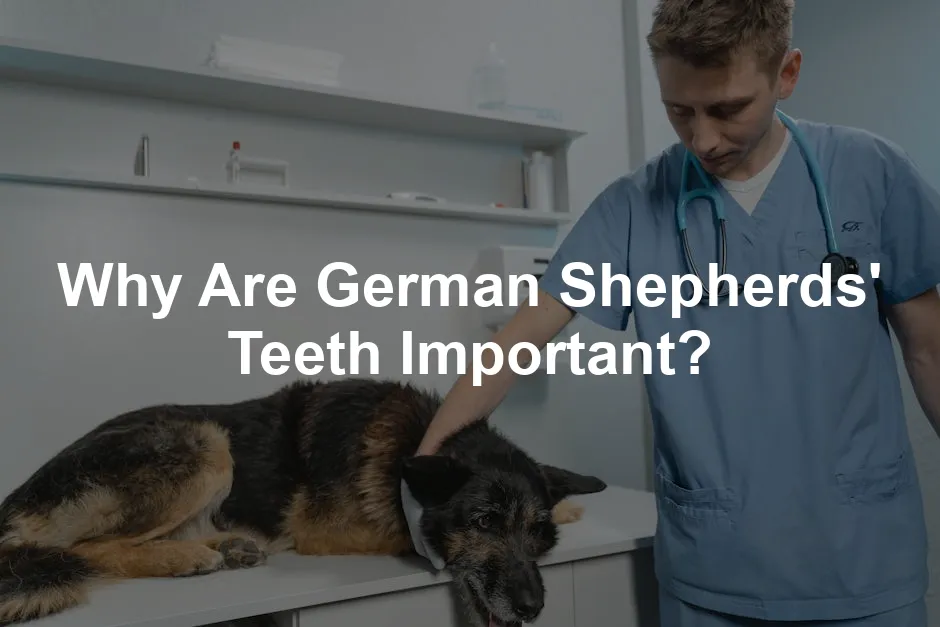
Why Are German Shepherds’ Teeth Important?
Introduction
Dental health is crucial for German Shepherds. Their unique dental structure, with 42 teeth, plays a vital role in their overall health. Neglecting dental care can lead to serious health issues, including infections and pain. To help keep your furry friend’s teeth sparkling, consider using a PetSafe Healthy Mouth Dog Dental Water Additive. This simple addition to their water can help reduce plaque and tartar buildup, making your life—and theirs—a whole lot easier!

Summary and Overview
Maintaining healthy teeth and gums in German Shepherds is essential. Good oral hygiene prevents plaque buildup, tooth decay, and gum disease. These dental issues can lead to systemic problems, affecting the heart, liver, and kidneys. In this post, we’ll discuss the teething process, common dental issues, prevention methods, and care routines. Keeping your dog’s mouth healthy contributes to a longer, happier life. And while you’re at it, why not treat them to an Nylabone DuraChew Textured Dog Chew? It’s not just a toy; it’s a dental hygiene hero!

Understanding German Shepherd Teeth
Anatomy of German Shepherd Teeth
German Shepherds have a total of 42 teeth. They possess four main types: incisors, canines, premolars, and molars. Each type serves a specific purpose in their carnivorous diet.
Incisors are the small front teeth, used for nibbling and grooming. There are 12 in total, six on the upper and six on the lower jaw. Canines, the four large pointed teeth, help grip and tear meat. These are crucial for their natural hunting instincts.
The breed has 16 premolars, which are sharp and designed for shearing. The carnassial teeth, located in the back, are especially important for chewing through meat and bone. Lastly, there are 10 molars that assist in grinding food, but their shape is adapted for a carnivorous diet rather than grinding plant matter.
Healthy teeth typically have an average lifespan of several years, but factors like diet and care can affect this. Proper dental hygiene ensures that your German Shepherd maintains strong, healthy teeth throughout their life. You might also want to consider Vet’s Best Enzymatic Dog Toothpaste to keep their pearly whites shining!

Teething Process in German Shepherds
Teething is a natural phase for German Shepherd puppies. It typically begins around 3 to 4 months of age and lasts until they are about 6 months old. During this time, their baby teeth fall out, making room for adult teeth. By the end of this period, your puppy will have all 42 adult teeth.
While teething, puppies may exhibit several common symptoms. You might notice excessive drooling as their gums become irritated. Chewing is another frequent behavior; they might gnaw on furniture, shoes, or anything within reach. This chewing helps soothe their sore gums. To keep them occupied and your furniture intact, consider a Petstages Dogwood Stick—a safe and fun alternative!
Other signs include biting or nipping at people, which can be frustrating. Your puppy may also show a reluctance to eat solid foods, opting for softer options instead. Irritability can occur too; teething is uncomfortable!
As a pet owner, it’s important to be patient during this time. Provide safe chew toys to help relieve discomfort. These toys can also keep them from damaging household items. Remember, this phase won’t last forever; soon, your German Shepherd will have a full set of healthy adult teeth.

Importance of Dental Hygiene
Keeping your German Shepherd’s teeth healthy is vital. Dental hygiene plays a significant role in their overall well-being. Poor oral health can lead to severe health risks. Bacteria from dental issues can enter the bloodstream. This can affect major organs like the heart, liver, and kidneys.
Imagine your dog suffering from infections that could have been prevented. That’s the reality of neglecting dental care. Bad breath is often the first sign of dental problems. But it doesn’t stop there. Painful chewing can lead to reluctance to eat, affecting their nutrition. To combat bad breath and support dental health, consider Arm & Hammer Dog Dental Chews—it’s a win-win!
Tooth loss is another consequence of poor dental hygiene. Losing teeth can severely impact your dog’s quality of life. They may struggle to enjoy their favorite foods or toys. Regular dental care helps you avoid these issues. It ensures that your German Shepherd can live a happy, healthy life.
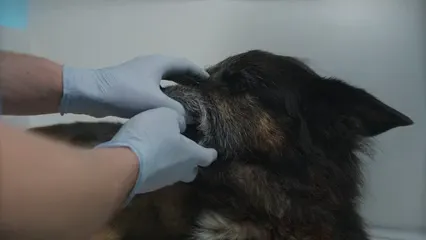
Consequences of Poor Dental Health
The health risks associated with poor dental health are alarming. Periodontal disease is one of the most common dental issues. It can lead to systemic infections that affect overall health. Bacteria in the mouth can enter the bloodstream and cause serious complications.
Infections can start in the mouth but may affect the heart and kidneys. This can lead to conditions like endocarditis or kidney disease. The pain and discomfort from dental issues can also affect your dog’s behavior. They might become irritable or withdrawn.
Moreover, bad breath, often a sign of dental issues, can be distressing. Imagine trying to cuddle with a dog that has persistent bad breath. It’s not pleasant for you or for them. Pain from dental problems can lead to a loss of interest in play and exercise. Ultimately, it lowers their quality of life and can shorten their lifespan. To keep their spirits high, consider getting them a Greenies Original Dental Treats—a tasty way to promote dental hygiene!

Benefits of Regular Dental Care
Regular dental care has numerous benefits. First, it keeps your dog’s breath fresh. Nobody wants to deal with unpleasant odors. Secondly, healthy teeth mean better chewing ability. Your German Shepherd can enjoy a wide variety of foods without discomfort.
Beyond comfort, regular dental care contributes to overall health. Maintaining clean teeth reduces the risk of infections. This can lead to fewer visits to the vet and lower medical costs over time. Investing time in your dog’s dental hygiene pays off in many ways. If you’re looking for a simple way to help your dog stay healthy, try a Vet’s Best Dental Gel Toothpaste—it’s a great addition to your dental routine!
Additionally, a clean mouth helps them feel better overall. They are happier and more energetic. Regular brushing and dental check-ups create a healthier environment. This ensures your German Shepherd lives a long and fulfilling life.
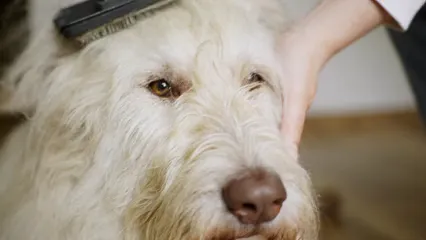
Best Practices for Maintaining Dental Health
Diet and Dental Chews
Maintaining your German Shepherd’s dental health starts with their diet. Consider feeding them dental-specific kibble. These foods are designed to reduce plaque and tartar buildup. When selecting a diet, look for options that promote oral health.
Dental chews are also highly beneficial. They help clean teeth and massage gums as your dog chews. Look for products approved by the Veterinary Oral Health Council (VOHC). These chews are effective at reducing dental issues. One excellent choice is the Zuke’s Z-Bone Dental Chew—your dog’s teeth will thank you!
Chew toys play a crucial role too. They keep your dog’s jaw strong while promoting dental hygiene. Choose sturdy toys that are safe for chewing. This will help prevent destructive behavior while ensuring your dog’s teeth stay clean. You can’t go wrong with a classic KONG Classic Dog Toy—a fun way to keep their teeth healthy!
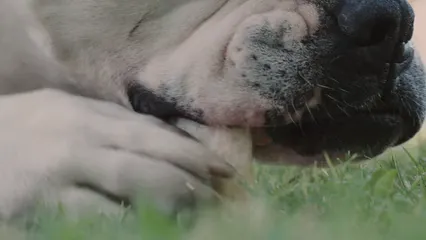
Professional Dental Cleanings
Regular veterinary check-ups are essential. Professional cleanings help maintain your German Shepherd’s oral health. During these visits, your vet will check for signs of dental disease. They can also remove tartar that brushing might miss.
Expect a thorough examination during a dental visit. Your vet will look for any issues like gum disease or tooth decay. In some cases, dental X-rays will be necessary to assess hidden problems. This proactive approach can prevent more serious health issues down the line.

Recognizing Signs of Dental Issues
Being aware of dental issues is key to your German Shepherd’s health. Bad breath is often the first sign of trouble. If your dog has persistent bad breath, it’s time to take action.
Drooling can also indicate dental problems. If your dog is drooling excessively, it might be a cause for concern. Another warning sign is reluctance to eat. If your dog avoids food or has difficulty chewing, dental issues could be the culprit.
Keep an eye out for these key signs as well: swollen or bleeding gums, yellow or brown spots on teeth, or loose teeth. If you notice any of these symptoms, consult your veterinarian promptly. Early intervention can save your dog from unnecessary pain and complications. Regular veterinary dental care is essential for a long, healthy life. And if you’re looking for a handy tool to help with that, consider grabbing a Dog First Aid Kit—better safe than sorry!
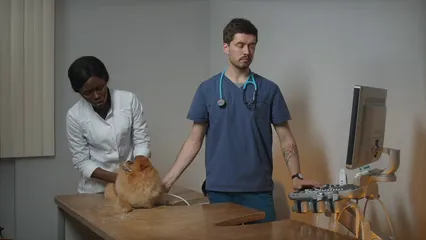
Conclusion
Maintaining dental care for your German Shepherd is crucial. Regular brushing and dental check-ups help prevent painful issues. By establishing a routine for dental hygiene, you ensure your dog’s health and happiness. Good dental health leads to fresher breath and less risk of infections. Plus, your furry friend can enjoy their favorite foods without discomfort. Remember, investing time in your dog’s dental care pays off in the long run, promoting a longer and healthier life. And don’t forget to pamper them with a Dog Grooming Gloves to keep their coat looking fabulous!

FAQs
How often should I brush my German Shepherd’s teeth?
Brush your German Shepherd’s teeth at least two to three times a week. Daily brushing is ideal for optimal dental care. This helps reduce plaque buildup and promotes healthy gums.
What are the signs of dental disease in dogs?
Common dental disease signs include bad breath, swollen gums, and difficulty eating. If you notice any of these symptoms, consult your vet to ensure your dog’s oral health.
Can dental problems lead to other health issues?
Yes, dental problems can cause systemic health issues. Bacteria from the mouth can enter the bloodstream, affecting vital organs like the heart and kidneys. Regular dental care helps prevent these serious conditions.
What should I do if my dog has bad breath?
If your dog has persistent bad breath, it may indicate dental issues. Start with regular brushing and consider dental chews. If the problem persists, consult your veterinarian for a thorough check-up.
Are dental treats effective for maintaining my dog’s dental health?
Dental treats can help maintain your dog’s dental hygiene. They reduce plaque and tartar buildup while freshening breath. However, they should complement regular brushing and not replace it.
Please let us know what you think about our content by leaving a comment down below!
Thank you for reading till here 🙂
All images from Pexels




